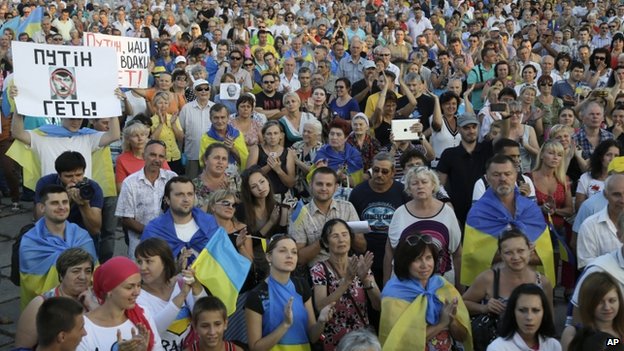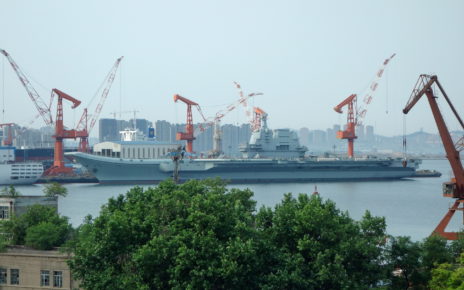In trying to facilitate support to its quest to stabilize the AfPak region, NATO is courting the Gulf states to support their mission, with one eye on the horizon and the threats the future may bring. In an interview November last year, NATO’s Secretary General Rasmussen stated, “We have a shared interest in helping countries like Afghanistan and Iraq to stand on their feet again, fostering stability in the Middle East… and preventing countries like Somalia and Sudan from slipping deeper into chaos.”
Certainly, it is not hard to understand why NATO is looking beyond its regional borders for cooperation. The geographical scope of its activities transcended Europe when it assumed command of the International Security Assistance Force (ISAF) in August 2003, and it has several initiatives looking for partners, such as the Partnership for Peace program (PfP) – taking place in the Caucasus and Central Asia – and the Mediterranean Dialogue (MD), within the vicinity of Europe. Additionally, as Afghanistan suffers and the escalation in levels of violence and instability, some of NATO’s members have become vulnerable to increasingly negative domestic views on the Afghan campaign. Thus effectively politicizing their commitment to the Afghan campaign, as was the case in the collapse of the government coalition in the Netherlands earlier this year. This increases pressure on NATO to find alternative partners to compensate diminishing levels of European commitment.
Enter Middle East. NATO’s foray in to the Middle East begun in earnest in 2004 with the Istanbul Cooperation Initiative (ICI), which aims to “enhance security and regional stability through a new transatlantic engagement with the region… … and improve countries’ capabilities to address common challenges and threats with NATO” by “actively promoting NATO’s cooperation with interested countries in the field of security,” particularly by contributing to NATO-led operations, in the fight against terrorism, countering the proliferation of WMD materials and illegal trafficking in arms, and enhancing energy security. Secretary General Rasmussen’s calls for increased cooperation with the Gulf Cooperation Council (GCC) states fit the trend of growing NATO activity in the region. After the signing of the ICI, NATO has actively sought to deepen military ties with the GCC member-states. Thus far, the United Arab Emirates (UAE), Qatar, Bahrain and Kuwait have held regular consultative meetings with a focus on military training and exchanges. Additionally, both Saudi Arabia and Oman have expressed interest toward greater cooperation with NATO.
NATO-Gulf Cooperation? Prospects and Impediments
On the surface, there are several indicative factors that the GCC states and NATO have substantial potential for cooperation. Firstly, there is substantial strategic convergence between NATO and GCC states on their perceptions of regional threats. For instance, Iran’s growing influence and alleged nuclear weapons program, the possibility of spillover effects of Yemen’s increasing instability and piracy in the Gulf of Aden are viewed with growing caution. Secondly, both NATO and GCC states acknowledge the geopolitical importance of the region, especially vis-à-vis energy security. Thirdly, both Gulf and NATO states view regional instability in AfPak as a potential and potent threat to regional stability in the Gulf. Indeed, the region is already experiencing increasing levels of drug trafficking and related societal problems, rise of (organized) crime, spread of HIV/AIDS, and growth of black markets and grey economy.
These shared perceptions have already led to some cooperation, especially in Afghanistan. Indeed, the GCC regimes are already committed to the stabilization efforts in Afghanistan, – which understandably is one of NATO’s main strategic concerns – by pledging aid to Afghanistan. Additionally, Bahrain and UAE have established a military presence. Bahrain has a contingent of 125 troops in Afghanistan, and UAE twenty-five. Although the military contingents of Bahrain and UAE are strategically insignificant, their presence is symbolically important. It is not unreasonable to expect that cooperation is likely to happen on other areas of common interests.
However, there are also several problems facing NATO’s future role in the Gulf. First, Saudi Arabia and Oman remain reluctant to sign up to the ICI. Oman has close relations with Iran and does not want to antagonize it, while Saudi Arabia is traditionally conservative in forging military alliances, preferring bilateral ties, particularly its historic relations with the United States. The position of Saudi Arabia is particularly problematic for NATO. It is the only GCC state with considerable political clout and the military hardware to match. A proactive Saudi Arabia would be a major diplomatic ally for NATO and it would have an alleviating effect on NATO’s image problems in the Middle East. The quagmires in Iraq and Afghanistan are perceived as Western military adventurism, and the Arab states are unwilling to adopt policies that would require them to ‘bail out’ the West. Additionally, the Global War on Terror (GWOT) is still widely perceived as a war against Islam, a narrative that is promoted by Wahhabi ideologues predominant in the region, and thus the insurgencies in Iraq and especially that in Afghanistan, have adopted an aggressive propaganda war that has allowed them to assume the mantle of the defender of Islam. This renders the counterinsurgency effort, and by association, the national governments anti-Islamic, as illegitimate and anti-Islamic. Riyadh’s current line, however, is all but proactive.
Thus, there are very tangible limits to NATO’s cooperation with the GCC states on Afghanistan. By aligning overtly with NATO, its policies and objectives, the Gulf states invite domestic instability and quite possibly eschew their own legitimacy which draws mainly from the regimes’ “Islamic credentials.” Likewise, NATO has very little to offer for Gulf states in terms of concrete benefits. Naturally, NATO cannot extend Article V to its partners in the Gulf, and it is unlikely that NATO’s goals to promote Security Sector Reform (SSR) in Gulf states will amount to much. Military and defense matters in the Gulf remain highly politicized, especially vis-à-vis arms purchases, and the conservative regimes are unlikely to risk alienating the military, which is historically the greatest threat to Arab regimes in the Middle East.
Furthermore, despite NATO’s increasingly international activities and a growing roster of non-European cooperation partners, NATO’s ability to be a truly global actor remains limited. The Strategic Concept guiding NATO’s overall strategy is dangerously outdated. Drafted during the Kosovo campaign in 1999, there have been major shifts in the security, strategic and geographic environments in which NATO operates. One of Rasmussen’s main goals is to oversee the drafting of a new Strategic Concept, expected to be released later this year. Without a Strategic Concept to guide NATO’s overall strategy in the Middle East and the Gulf, its role in the region is likely to remain limited.
Paper allies or paper enemies?
However, even if NATO could have a larger role in the region, it should reconsider its efforts to cultivate further cooperation with the Gulf states. While they are important partners in the Afghan mission, and contribute in to the stabilization of the country, the Gulf states also contribute substantially in to the destabilization of the AfPak region. While the regimes, especially Bahrain, and UAE, offer considerable support for the NATO mission in Afghanistan and showing symbolic support for Western efforts to battle Islamist insurgency, they have been unable or unwilling to confront the domestic support for Islamist insurgency emanating from the Gulf. Indeed, the West’s efforts to solicit Arab support for the fight against Islamist insurgency movements put the regimes in a difficult position. On the one hand, their domestic legitimacy is contingent upon their ability to uphold their Islamic credentials, and on the other hand, the regimes are highly dependent on Western support. The regional Wahhabi-friendly regimes are walking a tight rope between satisfying the West and not alienating the domestic audiences sympathetic to the Islamist causes.
Hence, at best the Gulf regimes acquiesce to exportation of Wahhabi-Salafist ideology and ideologues from the Gulf over to Afghanistan and Pakistan, as well as other potential strongholds for Islamist insurgency (e.g. Sudan, Yemen, Somalia, and Kenya), through petrodollar funded madrassas preaching Wahhabism. At worst, the regimes or elements within them actively fund and support proselytizing Wahhabi-Salafism in the AfPak region, but also the insurgency movements. Indeed, in an interview with CNN, Washington’s Special Envoy to the region, Richard Holbrooke, has deemed the funds flowing from the Gulf crucial to the Taliban insurgency, and estimated the amount of funds to be greater than Taliban’s profits from the opium trade.The main avenues for funneling financial support to the AfPak region have been through various Islamic charity foundations and the Hawala-system.
NATO’s main problem vis-à-vis cooperation with the GCC states therefore is that while the regimes follow an official policy compatible with NATO’s objectives, they still contribute to elements harmful to Afghanistan’s stability. Therefore, NATO’s main objective in the Gulf should be to identify and neutralize sources of support for the insurgency within the Gulf in cooperation with the local regimes. Of course, such policy implementation is rendered almost impossible by the domestic constraints of the Gulf regimes. In fact, it is unlikely that the regimes have the political capital to fully commit themselves in the fight against Wahhabi-Salafist movements in the AfPak theatre, let alone the people and organizations who are funding them from within the Gulf states, especially if they have connections to local elites.
Conclusion
There are a lot of difficulties facing NATO’s emerging cooperation with the Gulf states. The lack of a clear strategic direction, inability to affect the dynamics of SSR and facilitate earnest cooperation to clamp down on the flow of funds from the Gulf to militants in the AfPak seemingly renders NATO’s efforts to establish a role in the region moot. Indeed, it is more than likely that the Gulf regimes will continue to hedge their bets, appeasing both Islamist sympathizers and the West. Should the GCC states be able to become reliable allies on the GWOT, it would more than prudent to seek their diplomatic support. However, further cooperation with reluctant allies might provide a shield for the double-dealing Gulf regimes against criticism in their unwillingness to target elements supporting the insurgency in Afghanistan.
However, there is also considerable potential, should NATO be able to establish a wider mandate of action in the region. There is considerable convergence on the views of NATO and Gulf states on what the future threats to the region will be, and there should be a coherent effort to facilitate cooperation on those issues. It should not be underestimated how important the Persian Gulf region is to global stability. Nevertheless, NATO must be prudent in its search for regional allies. It must be understood that despite these common interests, there are also considerable divergence of interests, which should not be overlooked. While NATO needs regional partners, it does not need partners who are unable or unwilling to cooperate on matters central to NATO’s interests.
By: Juha Saarinen
Juha holds a Master of Letters in Middle Eastern and Central Asian Security Studies, and is currently a completing a Master of Science in International Relations at the London School of Economics. Juha also does research for the Royal United Services Institute (RUSI).
Sources
Istanbul Cooperation Initiative , Al-Arabiya: NATO looks to Gulf States for help in Afghanistan , Nato Afghanistan mission in doubt after Dutch withdrawal , An Emirati vision for NATO’s Gulf strategy , AFPAK: Defending Muslims or Defending al-Qa’ida Central? , Holbrooke: Persian Gulf money key to Taliban insurgency
Disclaimer: Any views or opinions expressed in this newsletter are solely those of the authors and the news agencies and do not necessarily represent those of the NATO Council of Canada. This article is published for information purposes only.



